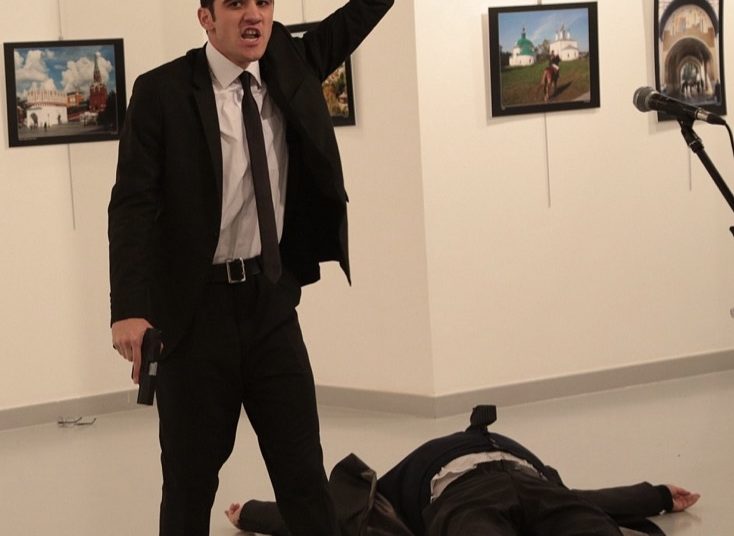Abdullah Bozkurt
The government of President Recep Tayyip Erdoğan awarded the police officer who killed Russian Ambassador Andrei Karlov 34 bonuses in two years’ time, a confidential government document has shown.
According to the personnel file of the 22-year-old assassin, Mevlüt Mert Altıntaş, obtained by Nordic Monitor, the police officer was given huge amount in bonuses within a very short period of time. The file, circulated internally on December 21, 2016, two days after the murder, was kept from the public by the government.
The file also shows that the government trained him in June 2016 on how to spot, identify and intercept suspicious people and vehicles, training that he made use of to blend in among the guests at the art gallery event during which he gunned down the Russian envoy.

The killer was recruited by the government as a police officer on June 26, 2014 in the aftermath of a mass purge of the veteran police chiefs who had investigated al-Qaeda, the Islamic State in Iraq and Syria (ISIS) and corruption that incriminated senior government officials including Erdoğan. Fearing the revelation of his government’s clandestine links to radical groups, Erdoğan orchestrated the suspensions, removals and imprisonment of police chiefs and replaced them with partisans, Islamists and neo-nationalists.
Altıntaş’s probationary period, usually a year for new recruits in the public sector in Turkey, ended on August 5, 2015, meaning that he had been cleared by his superiors, who found nothing to raise red flags in his performance reports. As a result, his candidate status was turned into a permanent job at the Security General Directorate (Emniyet).
First page of the assassin’s personnel file:
The file also indicates that the killer did not update his address in his personnel file and used his old address, although he had moved out of the apartment listed and was living in another flat with a roommate, lawyer Serkan Özkan, in the Kalaba neighborhood of Ankara’s Keçiören district at the time of the murder. Özkan’s law firm had close ties to Interior Minister Süleyman Soylu, a nationalist figure who gave the order to execute the assassin, who was already wounded and running low on ammunition.
A score card from a shooting range, kept by the police in the killer’s personnel file, indicated that he performed well in tests and scored far above average. The record shows that he was tested in target practice at 5, 10, 15, 20 and 25-meter distances using a Sarsilmaz pistol, manufactured by a Turkish company.

In a series of tests from 2014 to 2016, he performed well using an MP5 semi-automatic machine gun and a Canik TP9 handgun, the pistol he used in the assassination. The documents show he hit the target 58 times out of 60 in seven to 15-meter target practice.
Canik handguns are manufactured by Turkish company Samsun Yurt Savunma Sanayi ve Ticaret A.Ş. The Canik TP9 handgun with serial number T6472-14 AI27797, issued by the government to Altıntaş as his duty weapon, was serviced under warranty by the manufacturer in November 2016, a month before Altıntaş killed the ambassador with the same gun.
Shooting range test scores that show the killer was skilled at shooting from various distances:
The body of evidence and statements in the case file point to the fact that the killer was radicalized when he started attending sermons given by several radical imams, some on the Turkish government payroll, working for the Directorate of Religious Affairs (Diyanet). He had close ties to İbrahim Bilal Oduncu, a 35-year-old jihadist who had worked with the assassin and had been serving as muezzin (deputy imam) at Ankara’s Gimat Mosque, according to the indictment.
A series of contacts, both in person and over the phone, between Bilal and Altıntaş were revealed. Bilal and his brother, Murat Oduncu, have for some time been leading a Turkish al-Qaeda-affiliated front NGO that is operational in Turkey’s capital of Ankara with the protection of President Erdoğan’s government. Both of them were in contact with the killer and involved in activities to support jihadists in Syria. Another brother, Metin Ali Oduncu, who is also a district mufti working for the Diyanet, and his son Muhammed Selman Oduncu were involved with the killer to varying degrees.
Second page of the killer’s personnel file:
The killer and his roommate regularly attended the lectures of Nurettin Yıldız, a venomous preacher who advocates violent and armed jihad. Incidentally, Yıldız has often appeared as keynote speaker at events organized by Erdoğan’s ruling Justice and Development Party (AKP) youth branches as well as the Turkey Youth Foundation (TUGVA), which is run by Erdoğan’s family.
None of the imams who played significant roles in radicalizing Altıntaş were named as suspects in the case or charged with any crime. Radical, Al-Qaeda-affiliated Islamist groups were never made a subject of the investigation despite clear evidence of Altıntaş’s jihadist leanings and radical views.
Instead, Turkish authorities attempted to find a scapegoat in the Gülen movement, a group critical of the government, and frame innocent people who had nothing to do with the murder whatsoever. It was clear that the Erdoğan government wanted to protect radical networks and figures that it relied on as a political support base.
When the trial of suspects involved in the murder began, however, the government plot was dealt a huge blow when a key suspect accused by the prosecutor of instigating the hit exposed in court the torture he had been subjected to in police custody and testified that the statement extracted from him was fabricated by the police and that his family had been threatened.












